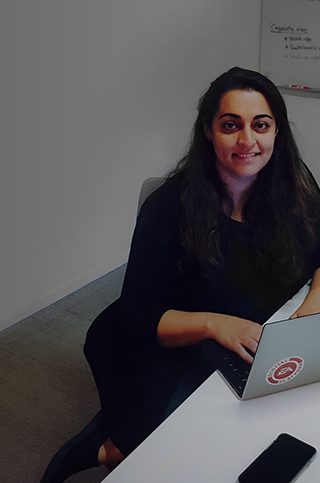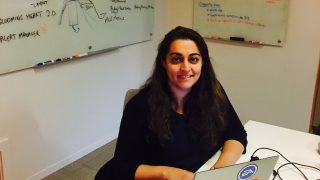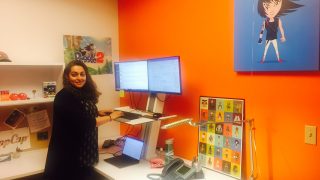Farah Ali, Player and Developer Experience
A conversation with Senior Director of Player and Developer Experience, Farah Ali.
In Their Own Words:

Senior Director of Player and Developer Experience Farah Ali was recently named one of Diversity Journal’s Women Worth Watching. We sat down with Farah to talk about technology and the importance of diversity in STEM.
How did you first develop an interest in technology?
Like most kids, I got sucked into tech via video games. I started playing games on the Atari and then with Space Invaders on a Commodore 64, but once I got into adventures games like Sam and Max, Day of the Tentacle and Monkey Island, I pretty much spent all my time outside of school on a computer.
Are there any mentors you’ve had along the way that have influenced your career? How have they helped you?
I wouldn’t have even been interested in computers had I not had a geek dad who loved gadgets and technology. It was rare in my neighborhood growing up to have a computer at home in the early 90’s. Having a dad who was always on top of the technology news of the time and having a computer at home that I could get hands-on experience on were big influences.

You’re the Senior Director of Engineering at EA. How do you effectively manage your time? Tell us about your day-to-day.
I think being a parent helped my time management skills more than any other role because I now measure every inefficient day spent at work as a reduction in quality time spent with my two girls. It also helps a lot to have an amazing admin who helps to keep my calendar sane. Once a quarter I sit down with Lilybeth (Executive Assistant, EADP) to plan work travel or key meetings and schedule out the speaking events, conferences, or all-hands I need to attend.
At the beginning of every week, I go through the calendar for the month so I can set agendas for meetings, plan around days I need to travel for work and re-schedule anything for that week based on priority. I merge my personal and work calendar so I don’t book over important events like birthdays or vacation travel. I usually have meetings daily during my commute back home. This way I don’t end up having a lot of meetings from home.
EA is proud to partner with Girls Who Code. What role do programs like that have in inspiring the next generation of women to work in STEM?
Programs like Girls Who Code are very important to show kids who are just entering high school what opportunities are available for them. Programs like these connect kids to networks that will help them enter careers in STEM and support them throughout their journey. It is important to introduce parents to what opportunities are out there and showcase role models who dispel myths and stereotypes about what a career in STEM is like for girls. I am an avid supporter of the program at EA and will be kicking it off for the second year in a row with a talk on my own personal journey in the hopes that I can inspire at least some of them to consider degrees in a STEM field.

You’re on the board for the women’s Employee Resource Group (ERG) here at EA. How does the ERG provide resources to EA employees?
The ERGs at EA are a way for incorporating a culture of diversity and inclusion at EA and give a diverse range of groups the ability to have a voice within large corporations in a way that may not be otherwise possible in a daily work context. The women’s ERG (called the Women’s Ultimate Team) is a way to bring people together of all genders, ethnicities, orientation to come up with ideas for how we can better support women in the workplace, provide personal and professional development and find ways to fill current diversity gaps in our products and business.
How would you describe your approach to STEM?
It’s about having genuine curiosity and passion for how the world around us works and drawing your own informed conclusions based on experimentation and data rather than going by gut. A technical education gives us a lot of tools, and it is up to us to use the right tools to solve problems, deriving metrics to measure outcomes and ultimately leading to smarter decision making.
What are some things you’ve learned along the way in your career that could help other women working in similar fields?
Don’t hold yourself back due to any preconceived notions you may have. Drive your own career, don’t expect your manager or mentor to drive it for you. After all, no one knows better than you what kind of future you see for yourself. Seek out allies and sponsors, there are many generous people both at work and industry. Don’t be shy to ask for help when you are overwhelmed, both in your personal and professional life. You cannot do your best work if you are under constant stress, and sometimes those who can help may not be aware that you need it until you ask. Most of all, be confident in your own abilities to do great work. You are where you are because you deserve to be.
What advice would you give to someone starting out in your field?
Hard work is your friend. Putting the extra time and effort at the start of your career to understand the fundamentals and focus on your strengths will pay off dividends in the long run. Don’t worry too much about areas that don’t come naturally to you, focus more on areas you know you can get great at with a little bit more practice or coaching.
What are the keys to being a successful leader in the tech field?
When I look to tech leaders in the field that I admire like Elon Musk or Bill Gates or Marie Curie three things come to mind: a true passion for technology and belief in the monumental changes it can bring in society, a lifelong approach to learning and growth not restricted to just the field of technology, and an understanding that technology is in and of itself just a means to an end be that space travel, democratization of knowledge or helping find cures to devastating diseases.
What inspired you most about Farah’s story? Let us know on Twitter!
Stay in the conversation of all things EA: Read our blog, follow us on Twitter and Like us on Facebook

